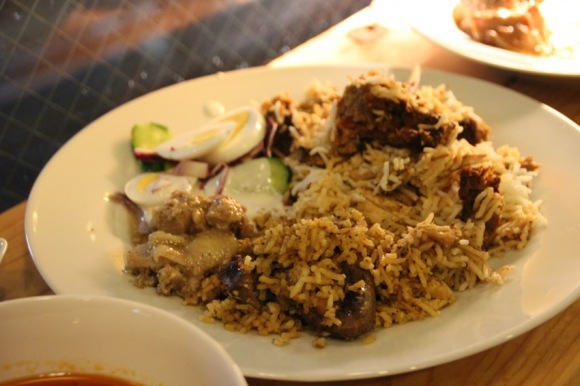
We Japanese love rice; we’re quite obsessed with rice, in fact. We all have our favorite brand of rice, depending on the specific type of rice and the location it was grown (yes, location is very important and can greatly affect the price of the rice), and some people shell out a fortune to buy super-expensive “high-end” brand rice. But not many Japanese people are familiar with biryani, the spicy flavored rice common in India and some Muslim countries as well.
One of our reporters at the Pouch site recently had the chance to taste some excellent biryani right in the middle of Tokyo and shares with us her experience. Her report follows below.
Biryani comes in various flavors and styles depending on the country or region, and once you acquire a taste a for it, you’re bound to want to try many different types of biryani. In Japan, you usually have to go to an Indian, Pakistani or Bangladesh Restaurant to get biryani, but we were surprised to discover that there is a specialty biryani shop (probably the first of its kind) right here in Tokyo, called Biryani Masala, run by a Japanese chef who has fallen in love with biryani — and it’s only open on Sundays.
The shop is located in the Setagaya ward of Tokyo, very close to Kyodo Station of the Odakyu train line, and the reason why it’s open only on Sundays is because it’s part of a restaurant sharing scheme (called the “Share Restaurant Rudder” ) where different restaurants open shop on different days of the week using the same location. Business hours can vary but the shop is usually open between roughly 5 p.m. and 9 p.m., and if you’re lucky they’re open for lunch on some days as well. If you’re thinking of going there yourself, you may want to check details on shop hours on the restaurant’s twitter page.
Apparently, the menu also varies depending on the day, but it’s basically an all-you-can-eat buffet with a drink. There are usually 3 types of biryani, which could be chicken, mutton and vegetable for example, and 2 kinds of home-made curry. There are also other dishes such as Uighur style sir-fried mutton, a yogurt-based Indian salad called raita or simple onion salad, all part of the buffet.
All of this sounds assuredly mouth-watering, and according to our reporter, the food doesn’t disappoint — as a matter of fact, it’s simply perfectly delicious, she says. Not only is the biryani cooked expertly, the rest of the dishes too are all guaranteed to satisfy even experienced connoisseurs of such ethnic cuisine. We guess that’s to be expected of a specialty biryani restaurant run by a group of people who have fallen in love with the dish, but it doesn’t make the food any less delightful.
What is also interesting are the unique discounts offered by the shop. There’s the “biryani T-shirt discount” where customers wearing the shop’s original T-shirt get a 500yen ($6.25) discount. Or, if you log in to Facebook and Twitter and upload a post with a photo, you can get 100yen ($1.25) off your order. But what we really recommend any customer to try is the “Eat with Your Hand Discount” where you get a 100yen discount if you eat with your hands, like it is done in areas where biryani is eaten locally.
Our reporter admittedly is crazy about biryani and has tried it in various countries including India, Sri Lanka and Bangladesh, and she says that in her experience, eating biryani or local curry dishes using your hands instead of a spoon makes it taste 100 times better. To the Japanese, it may be analogous to the difference between eating onigiri (rice balls) with your hands, which is the standard practice, and eating with a spoon, which we would never think of doing.
Interestingly enough, most customers at the shop when our reporter was there were eating with their hands. Well, if you’re willing to go out of the way to dine at a biryani specialty shop that operates only a very short time of the week, then you might as well go for the full experience. In any case our reporter fully recommends that you try eating with your hands, as she feels it definitely makes a difference in how the food tastes.
Oh, and if you’re concerned about getting your hands dirty, you needn’t worry. There’s a nice little hand-washing area right in the shop, which you’ll know is a very welcome touch if you’ve ever had the experience of eating biryani in other countries.
And last but not least, we can’t forget to mention the price. The all-you -can-eat buffet with one drink costs 2,500yen ($31.25) per person, but you can also have a plate of one biryani, some salad and raita with again one drink for 1,500yen ($18.75). Considering the prices, the buffet seems like quite a good deal, plus you’ll get to taste all three types of biryani. They do have alcoholic beverages and lassi, the popular yogurt based Indian drink as well, but our reporter thought the shop’s original hot chai was particularly delicious and not to be missed.
The restaurant has a nice, even romantic, atmosphere, and all in all, the shop comes highly recommended by our reporter. If you enjoy a bit of spice with your rice, and happen to be in Tokyo on a Sunday evening, we hope you have a chance to try the briyani at this unique and delightful restaurant. And don’t be afraid to get your hands dirty!
Restaurant Details for Biryani Masala
Address: Arms Kyodo 2F, 2-6-1 Kyodo, Setagaya-ku, Tokyo
Business Hours: Open Sundays only, Refer to shop’s Twitter page for details
Report and Phots by: Hatopon
Links: Biryani Masala on Twitter (Japanese)
Biryani Masala on Facebook (Japanese)
Enjoy some other photos from the restaurant!
[ Read in Japanese ]

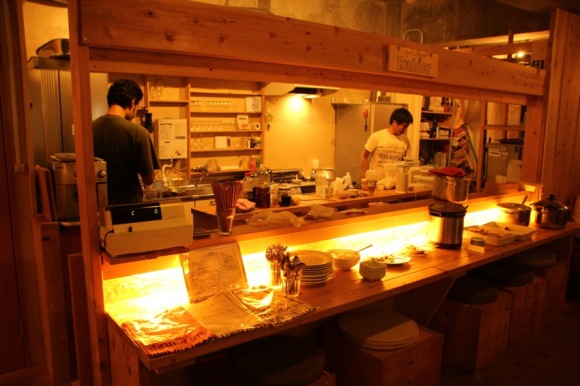
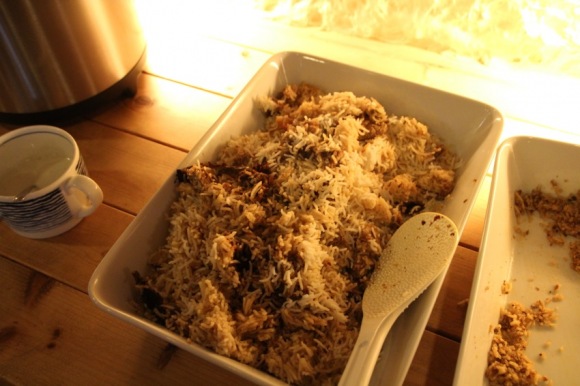
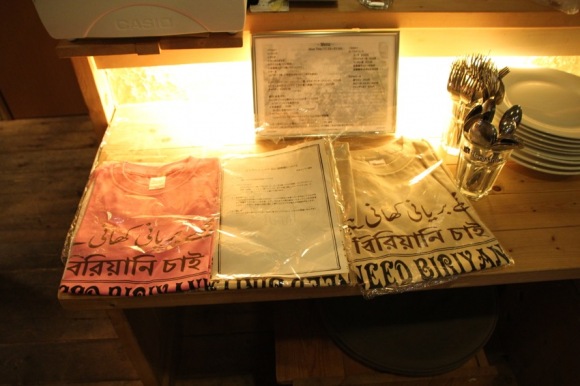
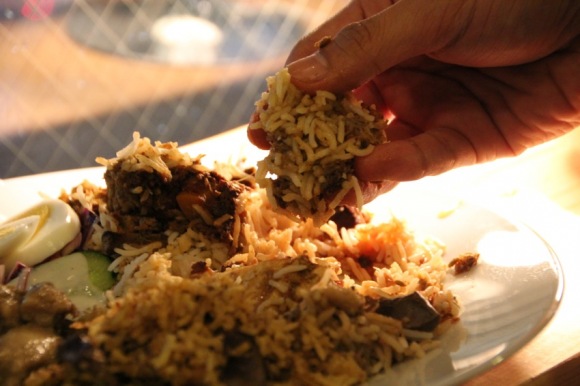


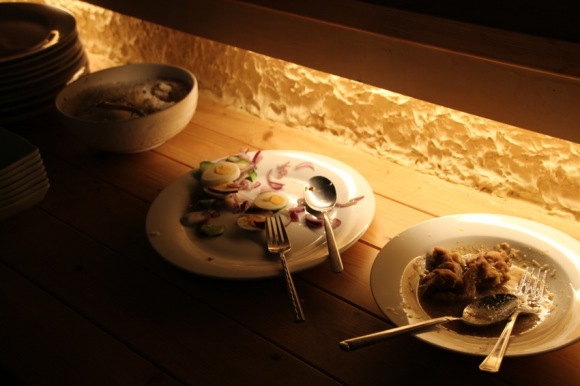
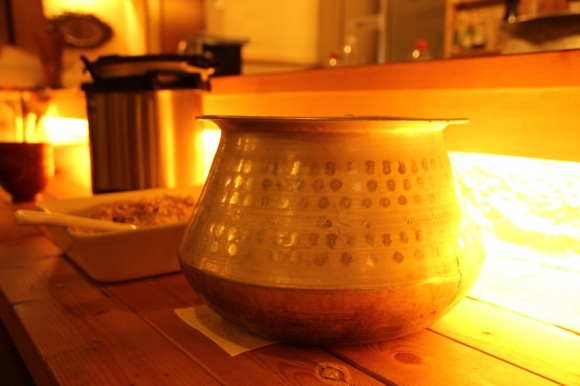
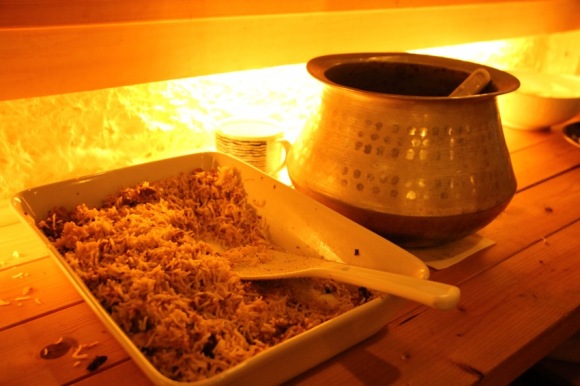
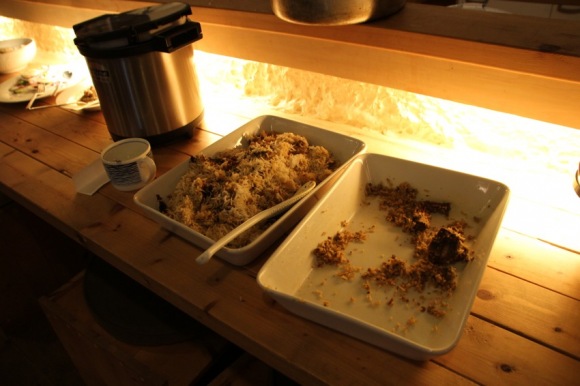
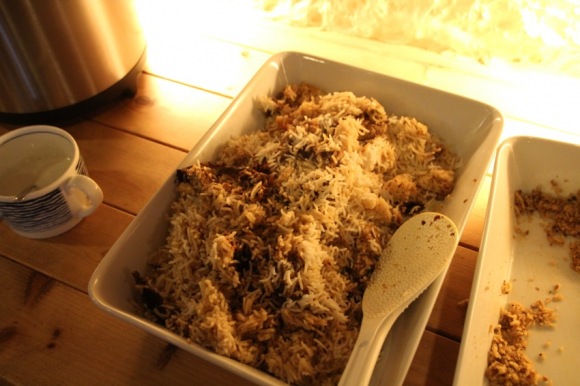
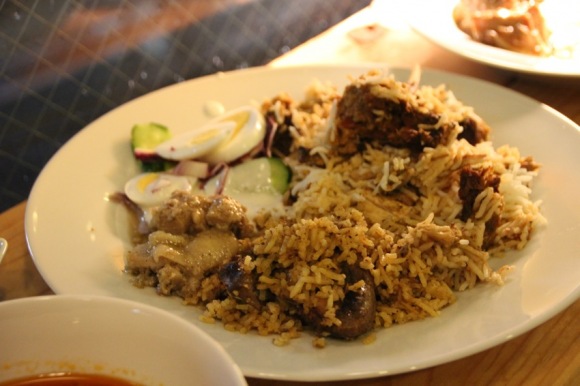
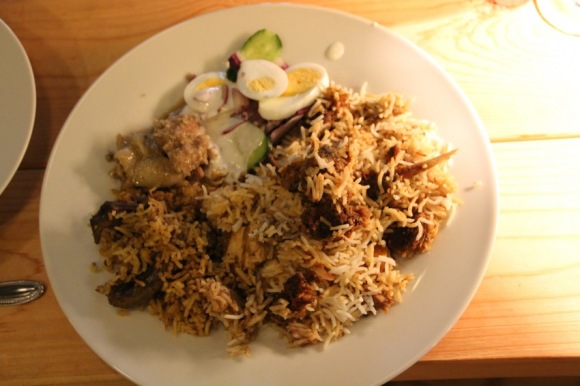
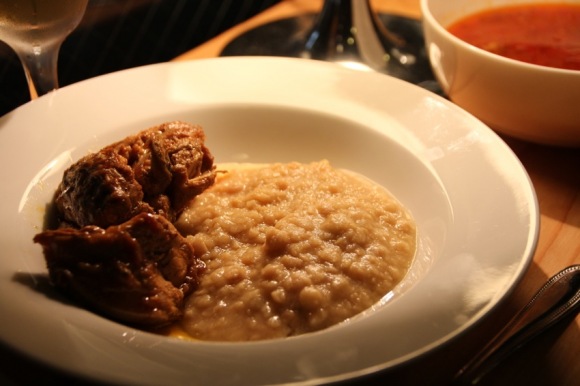
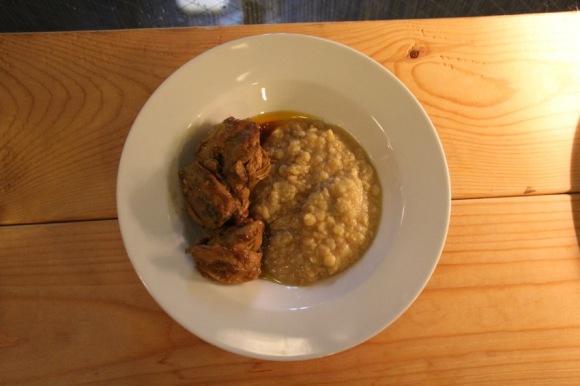
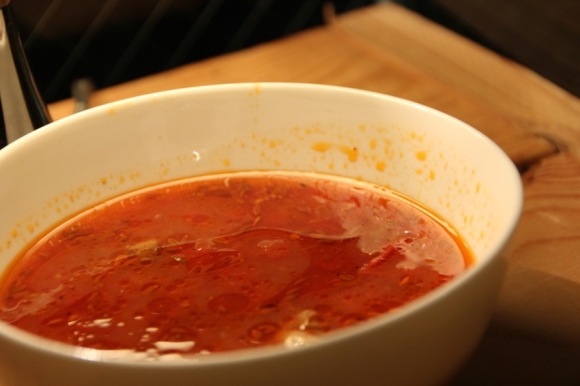
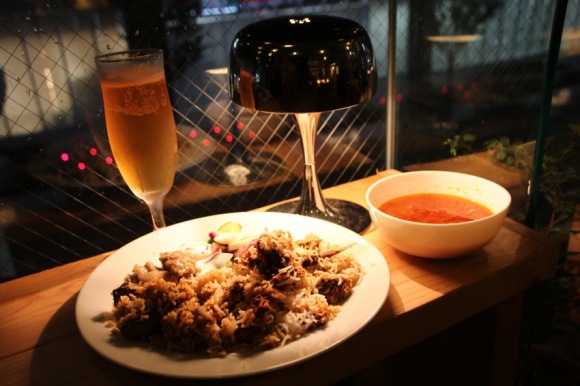
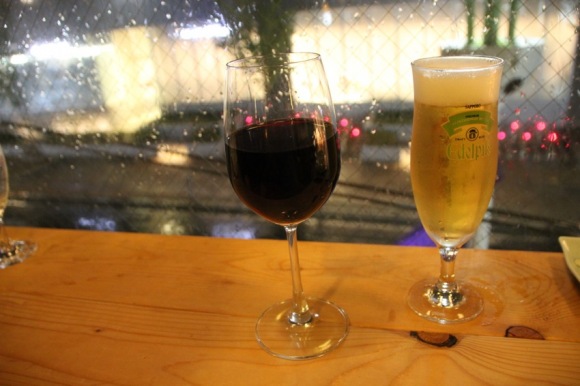
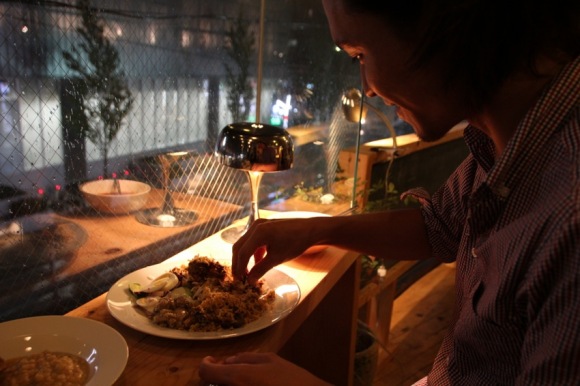


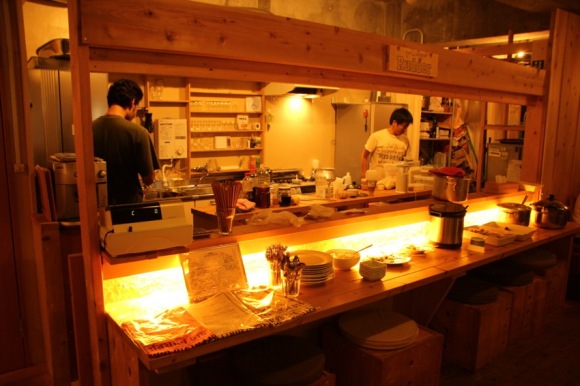
 7-Eleven Japan teams up with two different curry restaurants for one curry dish
7-Eleven Japan teams up with two different curry restaurants for one curry dish Made-to-order onigiri rice ball hotel breakfast buffet in Tokyo is open (and awesome) to all
Made-to-order onigiri rice ball hotel breakfast buffet in Tokyo is open (and awesome) to all Tokyo restaurant’s crazy huge rice omelet has 600 grams (1.3 pounds) of rice
Tokyo restaurant’s crazy huge rice omelet has 600 grams (1.3 pounds) of rice Tokyo restaurant offers amazing sushi lunch deal for less than 5 bucks
Tokyo restaurant offers amazing sushi lunch deal for less than 5 bucks Tokyo pub offers “balding discount” for follicly-challenged diners
Tokyo pub offers “balding discount” for follicly-challenged diners Potama serves up epic rice balls like no other, and there’s only one store in Tokyo
Potama serves up epic rice balls like no other, and there’s only one store in Tokyo Drift ice in Japan is a disappearing winter miracle you need to see now
Drift ice in Japan is a disappearing winter miracle you need to see now Family Mart ups its convenience store food game with special burger from beef bowl chain Matsuya
Family Mart ups its convenience store food game with special burger from beef bowl chain Matsuya Japanese restaurant chain serves Dragon Ball donuts and Senzu Beans this spring
Japanese restaurant chain serves Dragon Ball donuts and Senzu Beans this spring Hey! You Can Drink Sweet Potatoes, says Japanese beverage maker with new drink
Hey! You Can Drink Sweet Potatoes, says Japanese beverage maker with new drink Japan Extreme Budget Travel! A trip from Tokyo to Izumo for just 30,000 yen [Part 2]
Japan Extreme Budget Travel! A trip from Tokyo to Izumo for just 30,000 yen [Part 2] Yakuzen ramen restaurant in Tokyo is very different to a yakuza ramen restaurant
Yakuzen ramen restaurant in Tokyo is very different to a yakuza ramen restaurant Starbucks Japan releases first-ever Hinamatsuri Girls’ Day Frappuccino
Starbucks Japan releases first-ever Hinamatsuri Girls’ Day Frappuccino Saizeria meal hack by foreign diners introduces us to a secret dish that’s not on the menu
Saizeria meal hack by foreign diners introduces us to a secret dish that’s not on the menu Fully posable “Titan Eren” figure to debut next year, looks just as nude/terrifying as expected
Fully posable “Titan Eren” figure to debut next year, looks just as nude/terrifying as expected Highest Starbucks in Japan set to open this spring in the Tokyo sky
Highest Starbucks in Japan set to open this spring in the Tokyo sky Tokyo Skytree turns pink for the cherry blossom season
Tokyo Skytree turns pink for the cherry blossom season Japan Extreme Budget Travel! A trip from Tokyo to Izumo for just 30,000 yen [Part 1]
Japan Extreme Budget Travel! A trip from Tokyo to Izumo for just 30,000 yen [Part 1] Japan has only one airport named after a samurai, so let’s check out Kochi Ryoma【Photos】
Japan has only one airport named after a samurai, so let’s check out Kochi Ryoma【Photos】 Japanese drugstore sells onigiri at pre-stupid era prices, but how do they compare to 7-Eleven?
Japanese drugstore sells onigiri at pre-stupid era prices, but how do they compare to 7-Eleven? Burning through cash just to throw things away tops list of headaches when moving house in Japan
Burning through cash just to throw things away tops list of headaches when moving house in Japan Starbucks Japan releases new sakura goods and drinkware for cherry blossom season 2026
Starbucks Japan releases new sakura goods and drinkware for cherry blossom season 2026 Japan’s newest Shinkansen has no seats…or passengers [Video]
Japan’s newest Shinkansen has no seats…or passengers [Video] Foreigners accounting for over 80 percent of off-course skiers needing rescue in Japan’s Hokkaido
Foreigners accounting for over 80 percent of off-course skiers needing rescue in Japan’s Hokkaido Super-salty pizza sends six kids to the hospital in Japan, linguistics blamed
Super-salty pizza sends six kids to the hospital in Japan, linguistics blamed Starbucks Japan unveils new sakura Frappuccino for cherry blossom season 2026
Starbucks Japan unveils new sakura Frappuccino for cherry blossom season 2026 Foreign tourists in Japan will get free Shinkansen tickets to promote regional tourism
Foreign tourists in Japan will get free Shinkansen tickets to promote regional tourism The 10 most annoying things foreign tourists do on Japanese trains, according to locals
The 10 most annoying things foreign tourists do on Japanese trains, according to locals Take a trip to Japan’s Dododo Land, the most irritating place on Earth
Take a trip to Japan’s Dododo Land, the most irritating place on Earth Naruto and Converse team up for new line of shinobi sneakers[Photos]
Naruto and Converse team up for new line of shinobi sneakers[Photos] Is China’s don’t-go-to-Japan warning affecting the lines at a popular Tokyo gyukatsu restaurant?
Is China’s don’t-go-to-Japan warning affecting the lines at a popular Tokyo gyukatsu restaurant? Survey asks foreign tourists what bothered them in Japan, more than half gave same answer
Survey asks foreign tourists what bothered them in Japan, more than half gave same answer Japan’s human washing machines will go on sale to general public, demos to be held in Tokyo
Japan’s human washing machines will go on sale to general public, demos to be held in Tokyo Starbucks Japan releases new drinkware and goods for Valentine’s Day
Starbucks Japan releases new drinkware and goods for Valentine’s Day We deeply regret going into this tunnel on our walk in the mountains of Japan
We deeply regret going into this tunnel on our walk in the mountains of Japan Studio Ghibli releases Kodama forest spirits from Princess Mononoke to light up your home
Studio Ghibli releases Kodama forest spirits from Princess Mononoke to light up your home Major Japanese hotel chain says reservations via overseas booking sites may not be valid
Major Japanese hotel chain says reservations via overseas booking sites may not be valid Put sesame oil in your coffee? Japanese maker says it’s the best way to start your day【Taste test】
Put sesame oil in your coffee? Japanese maker says it’s the best way to start your day【Taste test】 No more using real katana for tourism activities, Japan’s National Police Agency says
No more using real katana for tourism activities, Japan’s National Police Agency says Pile It On! Beef Rice Bowls May be Japan’s Favorite Rice Bowl Dish, But This Pork Bowl Certainly Offers a Tasty and Voluminous Alternative
Pile It On! Beef Rice Bowls May be Japan’s Favorite Rice Bowl Dish, But This Pork Bowl Certainly Offers a Tasty and Voluminous Alternative Salvatore Cuomo restaurants are offering an all-you-can-eat pizza & pasta lunch buffet for cheap
Salvatore Cuomo restaurants are offering an all-you-can-eat pizza & pasta lunch buffet for cheap Japanese restaurant challenges diners to conquer “Mt Everest rice”
Japanese restaurant challenges diners to conquer “Mt Everest rice” Crazy Tokyo restaurant offers a 7.3-pound tempura rice bowl, so of course we had to eat it!
Crazy Tokyo restaurant offers a 7.3-pound tempura rice bowl, so of course we had to eat it! Sukiyabashi Jiro Sushi Rice: How good is rice from Japan’s legendary sushi restaurant?
Sukiyabashi Jiro Sushi Rice: How good is rice from Japan’s legendary sushi restaurant? There’s a permanent all-you-can-eat, all-you-can-drink KFC restaurant opening in Tokyo
There’s a permanent all-you-can-eat, all-you-can-drink KFC restaurant opening in Tokyo Matsushima restaurant offers all-you-can-eat sashimi in as many ways as you can dream it【Photos】
Matsushima restaurant offers all-you-can-eat sashimi in as many ways as you can dream it【Photos】 Tokyo restaurant offers all-you-can-eat Indian, Thai, and Chinese lunch buffet for under 10 bucks
Tokyo restaurant offers all-you-can-eat Indian, Thai, and Chinese lunch buffet for under 10 bucks Tokyo restaurant offers “DIY Tempura Bowls,” so of course we had to go check it out
Tokyo restaurant offers “DIY Tempura Bowls,” so of course we had to go check it out Haneda Market: Tokyo Station conveyor belt sushi restaurant is special on two days of the week
Haneda Market: Tokyo Station conveyor belt sushi restaurant is special on two days of the week Egyptian restaurant Sumo Sushi offers our Japanese reporter a delightful yet quirky lunch
Egyptian restaurant Sumo Sushi offers our Japanese reporter a delightful yet quirky lunch We test out the recipe for “botayama curry” featuring black sauce and black rice
We test out the recipe for “botayama curry” featuring black sauce and black rice With Japanese rice prices going crazy, can California rice win over our Japanese taste-testers?
With Japanese rice prices going crazy, can California rice win over our Japanese taste-testers? Restaurant rental service OPEN DISH offers risk-free restaurateur opportunity
Restaurant rental service OPEN DISH offers risk-free restaurateur opportunity No hungry customers here: Kansai restaurant offers huge portions, meals with 3,500 calories
No hungry customers here: Kansai restaurant offers huge portions, meals with 3,500 calories Mos Burger opens new online store dedicated just to frozen rice burger bulk buys
Mos Burger opens new online store dedicated just to frozen rice burger bulk buys